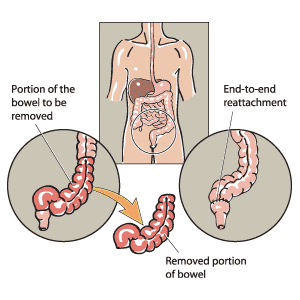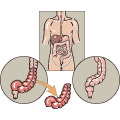Description of the procedure
A bowel resection is a surgical treatment in which a part of the large or small intestine is removed. It can be used to treat colorectal cancer as well as other bowel diseases, such as Crohn's disease, or to remove something blocking the bowel.
This procedure is done with general anesthetic in a hospital.
When should this procedure be performed?
Your doctor will decide whether the procedure is needed and when to perform it. This procedure can be repeated if necessary.
Why is this procedure performed?
A bowel resection can be used to prevent cancer from spreading to the surrounding area or other parts of the body by removing the colorectal tumour before it spreads. In cases where the cancer has already spread, a bowel resection can stop bleeding or remove obstacles in the intestine that have been caused by tumours. It can also be used to remove precancerous polyps or nodes, which can become cancerous if not removed. People with Crohn's disease or other bowel disorders may also need a bowel resection to remove diseased sections of the colon.
Are there any risks and precautions?
Certain risks are common to all surgery and anesthesia. These risks depend on many factors including the type of surgery and your own medical condition. The possible, but very rare, side effects include: side effects of the anesthetic, breathing problems, infection, bleeding, scarring, and death.
After bowel resection surgery, scar tissue may form around the bowel that may be painful and may block the bowel. A hernia (a bulge through the abdominal wall where the surgery was done) may also develop.
Though not required for most colorectal cancer cases, the surgeon may need to perform a colostomy if it is not possible to reattach the two parts of the colon or rectum. A colostomy is a surgical procedure where an opening is made in the abdominal wall in order for stool to pass into a colostomy bag located outside the body. In some cases, this is a temporary measure until the colon heals, but for people who have had their lower rectum removed, the colostomy is permanent.
If you are concerned about any symptoms following this procedure, speak to your doctor. Take the time to be sure you understand all the risks of complications and side effects as well as any precautions you or your doctor can take to avoid them. Be sure your doctor understands all your concerns.
What happens during the procedure?
A bowel resection is performed using general anesthetic, so you will not be awake during the procedure. It can be done either through an opening made in the abdomen or as a laparoscopic procedure. With laparoscopy, several small openings are made and the surgeon uses a viewing device to see inside the abdomen and operates using smaller tools. In both open and laparoscopic bowel resections, the surgeon removes the tumour (or damaged tissue) and some healthy tissue around it. The surgeon then reattaches the two healthy ends. If the surgery is being performed for colorectal cancer, nearby lymph nodes are also removed to be tested for cancer. The procedure usually lasts about 1 to 3 hours.
How should I prepare for this procedure?
Before having this procedure, discuss the advantages, disadvantages, long-term risks, and consequences associated with the procedure with your doctor. Be sure you fully understand what will happen and are comfortable with your doctor's answers to your questions.
The preparation for a bowel resection involves the standard preparation for any surgery. Do not eat for 8 hours before the procedure. You may continue to drink clear liquids until 2 hours before the procedure. If your doctor has recommended different times, follow the timing recommended by your doctor.
You will be instructed to take a strong laxative (medication to clear the bowel) usually the day before the surgery.
At least 2 weeks before the procedure, tell your doctor or prescriber about all prescription, over-the-counter (non-prescription), and herbal medications that you are taking. Also tell them about any medication allergies and medical conditions that you may have. Arrange for someone to drive you home from the hospital after the surgery.
Ask your doctor or pharmacist whether you need to stop taking any of your medications before the procedure.
What can I expect after the procedure?
After surgery, you will wake up in the recovery room. You will likely feel groggy, sore, and possibly nauseated. Any severe pain can be controlled with painkillers (delivered intravenously). Nurses will be available if you need help.
A bowel resection usually involves a hospital stay that may range from a couple days to 2 weeks. If you have colorectal cancer, you may also require radiation therapy and chemotherapy. Before you go home, the doctor or nurse will go over what you need to do at home to complete your recovery.
Results
Most people who undergo a bowel resection fully recover from surgery. A bowel resection is the only way to potentially cure colorectal cancer. The earlier the cancer is found, the better the chances are of curing it. Keep in mind that because colorectal cancer can return, follow-up screening is important.
All material copyright MediResource Inc. 1996 – 2024. Terms and conditions of use. The contents herein are for informational purposes only. Always seek the advice of your physician or other qualified health provider with any questions you may have regarding a medical condition. Source: www.medbroadcast.com/procedure/getprocedure/Bowel-Resection


